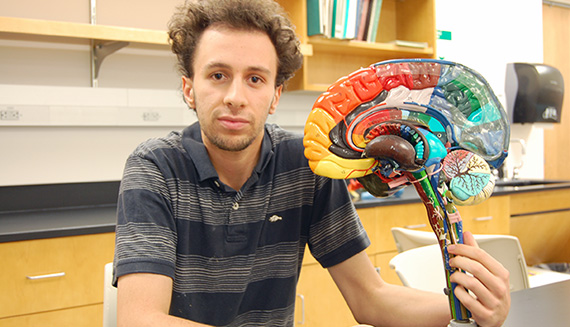│╔╚╦═Ě╠§ students are sharing their experiences conducting research with faculty members on campus and in the field. This post is by Casey Sherman ÔÇś14, of Vancouver, who is a major.
Each day you see hundreds of different stimuli. You pay attention to certain environmental features, but not to others; some things change, and others stay constant. At the end of the day, youÔÇÖre left with an array of memories. YouÔÇÖll forget some details from the day, but other memories remain with you for future use.
My thesis research, supervised by Professor , is intended to explore several questions about memory. How does attention to experiences affect your memory of them? Are changes or consistency in the environment more readily remembered? Are changes in the environment processed differently depending how much attention you pay to them?
My research will be based off of performance on the ÔÇťlexical decisionÔÇŁ task. In lexical decision, test subjects are instructed to indicate whether a presented string of letters is or is not a wordÔÇöits lexical status. My experiment will build off this decision by changing the color and case of the letter strings in several trials. Subjects will either respond based on lexical status and color or lexical status and case.
In a set of similar tests, Professor Johnson has found that response times decrease when the ÔÇťrelevantÔÇŁ featureÔÇölettercase if the subject was responding based on caseÔÇöis switched in the sixth trial after several consistent repetitions, but not if the irrelevant feature was switched.
My research will start out by attempting to replicate this pattern, and then giving a test of explicit memory. My test subjects will be shown a selection of letter strings, some that were part of the experiment and some not, and asked whether a given string was presented in the experiment. If they answer yes, they will be asked to indicate what color and letter case it was the last time they saw it.
Which letter strings will be more memorable: the consistent ones that were never changed, or the letter strings whose relevant feature was switched? What features of which letter strings will be remembered?
The answers to these questions could have applications to education by prescribing teaching methods that produce the best memory retention for material. The research is also applicable in the field of marketing, where ÔÇťsubliminal messagesÔÇŁ that escape conscious attention nonetheless influence consumer behavior.
ÔÇö Casey Sherman ÔÇś14
